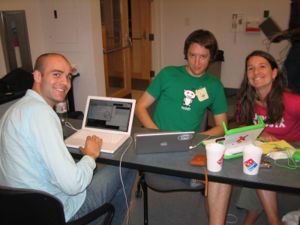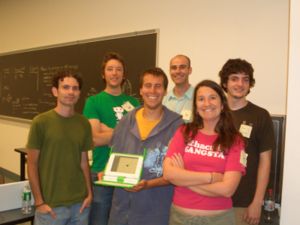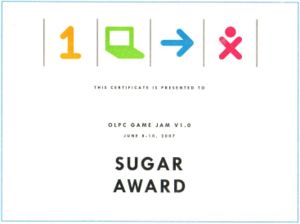Kuku: Difference between revisions
(form) |
|||
| (8 intermediate revisions by 8 users not shown) | |||
| Line 1: | Line 1: | ||
{{Translations}} |
{{Translations}} |
||
{{olpcboxtop | toptext = [[Kuku]] }} |
|||
{{Status box |
|||
{{ OBX activity |[[Image:Kuku.png|42px]]|games|short for 'Kuku Anakula' – "Hungry Chicken"}} |
|||
| ⚫ | |||
{{ OBX source dev |projects/kuku}} |
|||
| ⚫ | |||
{{ OBX devtickets |kuku-activity}} |
|||
|status = In Development/XO Testing |
|||
{{ OBX pot |
|||
|version = 0.1 |
|||
| pot = http://wiki.laptop.org/go/Kuku/Localization#kuku.pot |
|||
|base = 0.1 |
|||
| |
| po-root= http://wiki.laptop.org/go/Kuku/Localization# |
||
| |
| ar = ar_-_kuku.po |
||
| en = en_-_kuku.po |
|||
| ⚫ | |||
| es = es_-_kuku.po |
|||
| ⚫ | |||
| others = [[Kuku/Localization#pt_BR - kuku.po|pt_BR]] - [[Kuku/Localization#sw - kuku.po|sw]] |
|||
{{User:Xavi/Test/OBX}} |
|||
| root = [[Kuku/Localization]] }} |
|||
{{ OBX test |[[Kuku/Activity Test Plan|Kuku]] }} |
|||
| ⚫ | |||
{{olpcboxbottom}} |
|||
__TOC__ |
|||
=Description & Goals= |
=Description & Goals= |
||
| Line 88: | Line 93: | ||
Team Kuku after the first night of the Game Jam at Olin College, with kuku running: Roberto, Julius, |
Team Kuku after the first night of the Game Jam at Olin College, with kuku running: Roberto, Julius, |
||
Matt, Adrian, Sera, Brian. |
Matt, Adrian, Sera, Brian. |
||
[[Image:Sugaraward.jpg| 300px]] |
|||
Team Kuku won the children's choice award, the Sugar Award. |
|||
* [[User:Lucks | Julius Lucks]] (jblucks on #sugar and #olpc-content IRC) |
* [[User:Lucks | Julius Lucks]] (jblucks on #sugar and #olpc-content IRC) |
||
* [http://www.delmaestro.org/adrian/ Adrian Del Maestro] |
|||
* Adrian DelMaestro |
|||
* [http://slyjbl.hopto.org/~serayoung/ Sera Young] sly3 (at) cornell (dot) edu |
* [http://slyjbl.hopto.org/~serayoung/ Sera Young] sly3 (at) cornell (dot) edu |
||
* Roberto Christen (roberto (dot) christen (at) gmail (dot) com) |
* Roberto Christen (roberto (dot) christen (at) gmail (dot) com) |
||
| Line 108: | Line 117: | ||
[http://www.linuxjournal.com/article/7694 Linux Journal Pygame Article] |
[http://www.linuxjournal.com/article/7694 Linux Journal Pygame Article] |
||
[[Activity tutorial]] |
|||
[[Sugar_Activity_Tutorial]] |
|||
[[Kuku/Activity_Test_Plan|Kuku Activity Test Plan]] |
|||
[[Educational_activity_guidelines]] |
[[Educational_activity_guidelines]] |
||
| Line 127: | Line 134: | ||
[[Kuku/Sugar_Install_Notes]] |
[[Kuku/Sugar_Install_Notes]] |
||
[[Kuku/Git_Usage]] |
|||
[[Pygame wrapper]] |
[[Pygame wrapper]] |
||
[[Category:Activity]] |
|||
[[Category:Software ideas]] |
[[Category:Software ideas]] |
||
[[Category:Games]] |
[[Category:Games]] |
||
{{Activity page |
|||
| ⚫ | |||
|genre=Math and Science |
|||
|short description=Kuku (Hungry Chicken), is based on the basic arithmetic education game Number Munchers. |
|||
|long description=In single player mode, the game consists of a simple grid that the player (a chicken) is allowed to move around on. A question is posed outside of the grid, such as '5 + 5 = ?', and each square in the grid has a potential answer in it. The goal is to 'eat' as many correct answers as possible within a given time frame to accumulate points. There are penalties for eating incorrect answers, and the questions are changed when all correct answers are eaten. As the game progresses, the questions become more difficult. In multiplayer mode, the grid will be able to expand with multiple chickens that can compete against each other, or work as a team to eat all the correct answers. |
|||
|contact person=User:Lucks |
|||
|activity source=http://dev.laptop.org/git?p=projects/kuku |
|||
| ⚫ | |||
{{Activity bundle |
|||
|bundle URL=http://dev.laptop.org/~lucks/kuku.xo |
|||
| ⚫ | |||
}} |
|||
Latest revision as of 00:43, 7 August 2008
|
Description & Goals
Summary
Kuku, short for 'Kuku Anakula' (Hungry Chicken), is based on the basic arithmetic education game Number Munchers. In single player mode, the game consists of a simple grid that the player (a chicken) is allowed to move around on. A question is posed outside of the grid, such as '5 + 5 = ?', and each square in the grid has a potential answer in it. The goal is to 'eat' as many correct answers as possible within a given time frame to accumulate points. There are penalties for eating incorrect answers, and the questions are changed when all correct answers are eaten. As the game progresses, the questions become more difficult. In multiplayer mode, the grid will be able to expand with multiple chickens that can compete against each other, or work as a team to eat all the correct answers.
We imagine this game to be one instance that relies on a more general question-answer, or quiz library. The idea is that all of the questions and answers will be stored and editable by kids and teachers. Question content is not restricted to basic arithmetic, but can consist of multiple choice questions, vocabulary questions, image recognition questions, and many more. Specific examples might consist of:
- a fill in the blank sentence as the question with multiple vocabulary words as the answers
- a snapshot of a tree taken by the child as the question with names of types of trees as the answers
- an arithmetic expression as the question with numbers as the answers
In order to develop this game then, we would like to develop a simple question and answer library that teachers can use to port their existing materials for the game. The game can then be considered as a study tool for children for an upcoming test, and we imagine that the same library will be useful in a testing activity which actually conducts the test on the laptops.
We also think that the structure of this game will get kids interested in developing their own content or versions of the game. Having questions and answers in easily editable files will introduce children to poking around the internals, and we hope to design the game code in such a way as to naturally lead the children into learning about programming and tweaking the game themselves. This might be done through the quiz library using programming expressions to generate incorrect, 'red herring', answers for seeding the grid.
We greatly appreciate discussion, especially on the design of the question/answer library (see below).
Goals
- To develop a general question/answer library that teachers can use to port existing quiz material for use in this game and other activities.
- To develop a Number Munchers-like game activity that enables children to be quizzed on a variety of educational topics in a fun way
- To emphasize the fact that both the content and the game itself can be changed through project structure as well as hints to the children in the activity that this can be done.
Collaboration
- We hope to create a multiplayer mode that allows several players (communicating through the mesh) to be able to play on the same grid in either competition or cooperation mode.
We Need Your Help!
Right now the Kuku code runs, but it is in an awful state! We would love feedback and help in the following areas:
- game design and flow: any ideas about how to make the game more interesting and challenging for the kids
- interfacing with educators: feedback on the best way to make the game content adjustable by educators
- internationalization!: we need to get this effort going
- testing: see our testers page for instructions on downloading and testing Kuku.
Please contact us if you would like to help out.
Other Pages
Please look at these other Kuku pages for more information on specific topic.
- Kuku Game Description - A description of how the game is played.
- Kuku Quiz Questions - How the questions are formatted, how to edit them to make kuku ask your questions.
- Kuku Visual Design - The visual layout of the game.
- Kuku Story Board - Developing a broad story board to put quiz levels in the context of a fun adventure.
- Version History - A description of each of the versions.
- Localization - Discussion of how kuku handles localization.
- Kuku Activity Test Plan - How to do usability testing for Kuku.
- Kuku for testers - How to install and run kuku.
Development
Source
The code is just python and pyGame. The code can be checked out and dropped into a directory called Kuku.activity and placed in a Sugar activities directory to be able to work on an XO.
Activity Source: http://dev.laptop.org/git.do?p=projects/kuku
git clone git://dev.laptop.org/projects/kuku
Activity xo bundle (un-zip with unzip kuku.xo): http://dev.laptop.org/~lucks/kuku.xo
curl -C - -O http://dev.laptop.org/~lucks/kuku.xo
Git Usage
Please look at our git usage page for instructions on how to work with our branching structure.
People
Adrian, Julius and Sera hacking away at the Boston 2007 Game Jam.
Team Kuku after the first night of the Game Jam at Olin College, with kuku running: Roberto, Julius, Matt, Adrian, Sera, Brian.
Team Kuku won the children's choice award, the Sugar Award.
- Julius Lucks (jblucks on #sugar and #olpc-content IRC)
- Adrian Del Maestro
- Sera Young sly3 (at) cornell (dot) edu
- Roberto Christen (roberto (dot) christen (at) gmail (dot) com)
- Matthew Myers matt (at) 2eastmusic (dot) com
- Brian Jordan bjordan (at) wesleyan (dot)edu
Resources
- A web version of the original Number Munchers game (Firefox on Windows only).
- A down loadable version of the original Number Munchers game.
- Number munchers on Wikipedia
- Lincolnquirks git version of olpcgames git://dev.laptop.org/projects/games-misc
Useful Links
Educational_activity_guidelines
Wikipedia on Internationalization
Activity Summary
| Icon: | Sugar icon::Image:Kuku.png |
| Genre: | Activity genre::Math and Science |
| Activity group: | ,|x|Activity group::x}} |
| Short description: | Short description::Kuku (Hungry Chicken), is based on the basic arithmetic education game Number Munchers. |
| Description: | [[Description::In single player mode, the game consists of a simple grid that the player (a chicken) is allowed to move around on. A question is posed outside of the grid, such as '5 + 5 = ?', and each square in the grid has a potential answer in it. The goal is to 'eat' as many correct answers as possible within a given time frame to accumulate points. There are penalties for eating incorrect answers, and the questions are changed when all correct answers are eaten. As the game progresses, the questions become more difficult. In multiplayer mode, the grid will be able to expand with multiple chickens that can compete against each other, or work as a team to eat all the correct answers.]] |
| Maintainers: | ,|x|Contact person::x}} |
| Repository URL: | Source code::http://dev.laptop.org/git?p=projects/kuku |
| Available languages: | ,|x|Available languages::x}} |
| Available languages (codes): | ,|x|Language code::x}} |
| Pootle URL: | |
| Related projects: | Related projects,|x|Related projects::x}} |
| Contributors: | ,|x|Team member::x}} |
| URL from which to download the latest .xo bundle | Activity bundle:: |
| Last tested version number: | |
| The releases with which this version of the activity has been tested. | ,|x|Software release::x}} |
| Development status: | |
| Ready for testing (development has progressed to the point where testers should try it out): | ,|x|Ready for testing::x}} |
| smoke tested : | |
| test plan available : | |
| test plan executed : | |
| developer response to testing : |
| URL from which to download the last .xo bundle that works with old releases | Activity bundle::http://dev.laptop.org/~lucks/kuku.xo |
| Activity version number: | Activity version::1 |
| The releases with which this version of the activity has been tested. | ,|x|Software release::x}} |
| Development status: |


